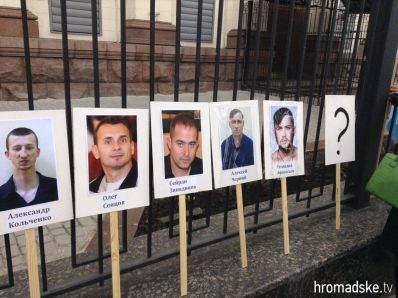New Surreal Trial of Maidan Activist in Russian-occupied Crimea
 Some of the Ukrainians already held prisoner either in Crimea or in Russia
Some of the Ukrainians already held prisoner either in Crimea or in Russia
A sinister new trial is looming in Russian-occupied Crimea of a young man charged with the attempted murder of two Berkut officers in Kyiv during Euromaidan. The charges are legally nonsensical as Russia cannot possibly have any jurisdiction over events that allegedly took place in Ukraine against Ukrainian Berkut officers before annexation. This did not stop an occupation court from sentencing Oleksandr Kostenko to 4 years imprisonment in May 2015, and all signs suggest that the same contempt for fundamental principles of law will be demonstrated here.
The report on the Crimean prosecutor’s website names the accused man as Andrei Kolomiyets, born in 1993, and says that he is charged with the attempted murder of two people carrying out official duties, with this supposedly motivated by political or ideological hatred. Kolomiyets is accused of being “a member of an extremist organization – the Ukrainian Insurgent Army [UPA]” and of making an attempt on the lives of the two Crimean Berkut officers by hurling Molotov cocktails at them.
It is unclear where the de facto Crimean Prosecutor Natalya Poklonskaya has come up with such an organization, which if it does exist, and that is in question, is extremely marginal. Journalist Allison Quinn is currently looking into the few mentions in mainland Ukraine of such a group, and is suspicious that the Kremlin always appears to be involved. It could simply be intended to arouse associations with the UPA during the Second World War which Russia is continuing to demonize, whereas allegations about recognized movements will immediately prompt official denials. Mention of such a purported organisation, together with the general lack of information about this young man, give grounds for fearing that he may have only a lawyer provided by the investigators. All too often such lawyers are there only to encourage the person to ’confess’ and sign documents.
More importantly, there is no way that the alleged ‘attempted murder’ could be proven even had the two officers not almost certainly been Ukrainian nationals working in Ukraine. Article 12 § 3 of Russia’s Criminal Code states clearly that a criminal prosecution can only be initiated against foreign nationals who committed an offence on the territory of another country if “the crime was directed against the interests of the Russian Federation or a citizen of the Russian Federation.”
Judging by a previous report, the only Russian national to be seen in this case is Kolomiyets himself. Back in September 2015 Poklonskaya reported that a Russian who took part in Maidan had been arrested 6 weeks earlier in Russia and brought to Crimea. Although Poklonskaya has previously bandied around threats of up to 50 such ‘cases’, this one she said would shortly be sent to court.
If Kolomiyets is a Russian national, then unlike in the cases of Kostenko and at least 8 other Crimeans whom Russia is holding prisoner, Russia’s right to prosecute him cannot be disputed. If there is a crime, however, and here the charges are grotesque.
It is clear that somebody has considered the possibility that a proper lawyer will be taken on and another charge has therefore been added. Kolomiyets is also accused under the article on illegal purchase, possession and transportation of a large amount of a narcotic plant. This was supposedly a large amount, but only for personal consumption. The mention of ‘large quantity’ is possibly sinister and aimed at justifying keeping him in detention since the relevant article of the Criminal Code carries a potential sentence of up to 10 years.
Clearly ‘attempted murder’ is even more serious – or would be if the charges were not so absurd.
As mentioned, there is little originality in the case, with Ukrainian Oleksandr Kostenko currently in a Russian prison on almost identical tandem of unproven and unprovable charges.
The Ukrainian Euromaidan activist was convicted of slightly injuring a Ukrainian Berkut riot police office in Kyiv on Feb 18, 2014. He was supposed to have deliberately aimed a cobble stone at Crimean Berkut officer Poliyenko who allegedly suffered a bruise on his left shoulder. Kostenko was supposed to have been motivated by “a feeling of ideological hatred and enmity to law enforcement officers”.
Since the Berkut officer had not been a Russian national at the time of the alleged incident, there was no possibility of keeping Kostenko in detention and then imprisoning him. Kostenko was therefore later also accused of ‘”unlawfully obtaining, keeping or carrying the main parts of a firearm”). The investigators claimed to have found a rifle barrel when searching his home.
Not one of the official witnesses of the search confirmed that weapons were found in Kostenko’s flat. The investigators claimed that Kostenko’s father, Fedir Kostenko had identified the gun barrel as belonging to his son. They also claim, however, that it was Kostenko Senior who gave permission for the search. Fedir Kostenko disappeared shortly after this in circumstances which also arouse serious concern.
Kostenko had been effectively abducted and illegally held in detention. During the first unrecorded day torture was used to extract an initial ‘confession’. As soon as a real lawyer, Dmitry Sotnikov, came on the scene, the clear evidence of torture (including a broken arm) was recorded, and the ‘confession’ retracted.
This was ignored by Poklonskaya who ran the prosecution herself and by the court
The Memorial Human Rights Centre declared Kostenko a political prisoner in May 2015, and Ukraine has repeatedly demanded his release.
Next to nothing is known about Andrei Kolomiyets, nor the supposed group that he is reported to have been a part of, and it is worryingly likely that he has little, if any protection against such cynical lawlessness.





